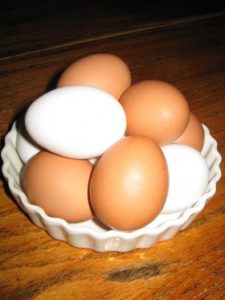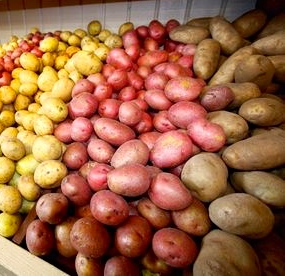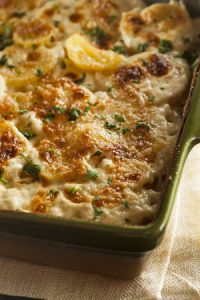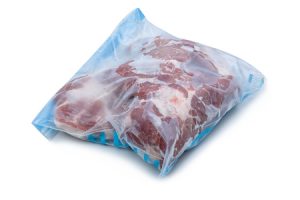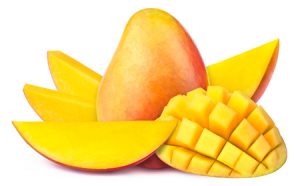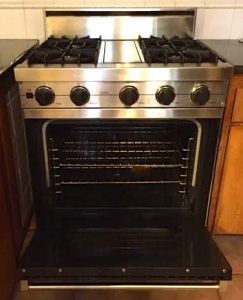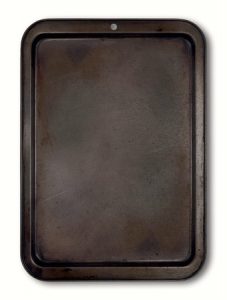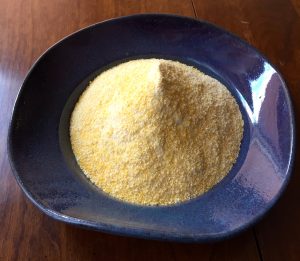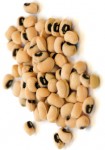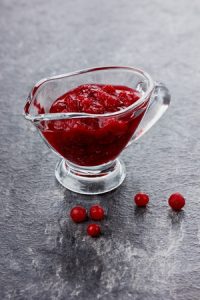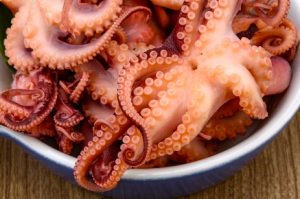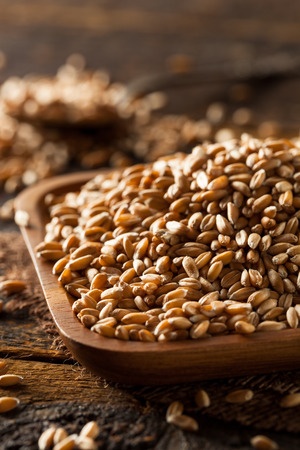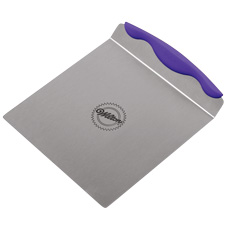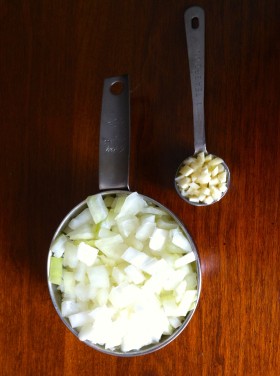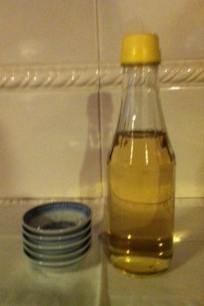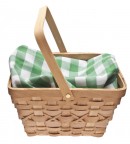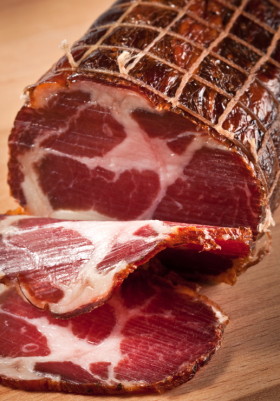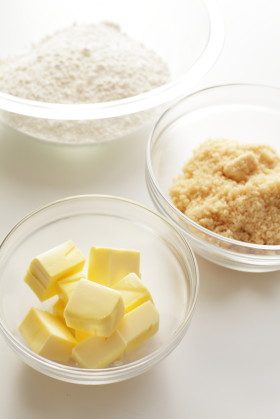
Kitchen Shrink
Eggs: How long can I keep hard-cooked eggs?
Each year just after the spring holidays the Kitchen Shrink gets e-mails asking about storing hard-cooked eggs. According to the American Egg Board’s Eggcyclopedia, hard-cooked eggs should be cooled and refrigerated as soon as they have been cooked. Store them in their shells and use them within one week.
Eggs: Can I substitute another size egg for large eggs in a recipe?
Marilee e-mailed the Kitchen Shrink that she always buys jumbo eggs and wondered if it is all right to use them when a recipe calls for large eggs. Most recipes call for large eggs because that is the size that is purchased most often in American supermarkets. If you are…
Kitchen Shrink: Can I freeze potatoes?
A viewer recently asked, “Can I freeze potatoes?” Although you can’t freeze raw potatoes (they discolor and the texture changes), if you suddenly have way more potatoes than you can use before they wrinkle, you can freeze some for a short period of time with the right preparation. You might…
Tapioca Starch: How do you use tapioca starch?
I just received an e-mail asking me about using tapioca starch to thicken soups and desserts. Tapioca, manioc, or cassava starch is a fine white powder produced from the cassava root, which is grown in Central and South America, Florida, the Caribbean Islands, and temperate climates around the world. While…
Kitchen Shrink: How can you keep Scalloped Potatoes from curdling?
I recently got a question from Phyllis who asked, “Every time I make scalloped potatoes my sauce breaks. What am I doing wrong.” This seems to be a frequent problem with scalloped potatoes particularly when you use a recipe that calls for layering the potatoes, onions, and cheese and pouring…
Kitchen Shrink: Is it true that you can only freeze raw meat once and cooked meat once? Why?
Randall, a viewer, asked “The rule had always been, you could freeze raw meat once and cooked meat once. Is this true and why?” I think it is a pretty good rule of thumb. However, the United States Department of Agriculture Food Safety and Inspection Service web site which gives…
Kitchen Shrink: How to select and cut a mango.
I got a question on my web site from Tammy who said “I was wondering, if you could tell me how to select a good mango and the proper way to cut it?” Both very good questions. First of all a mango’s color indicates its variety not its ripeness, so red…
Kitchen Shrink: How do you decide which level of the oven to use?
I recently received a question from Wendell who asked, “ how do you decide which level of the oven to use for a given task.” In most cases selecting the rack in the middle of the oven is a good choice unless the recipe tells you to use the upper…
Kitchen Shrink: How do you clean burned-on fats from baking pans and keep them clean?
The other day I got a question on my web site from Aletha who is having trouble cleaning burned-on fat from a baking pan. She wondered how to clean the pan and then asked how I keep my pans clean. I’ll answer the second question first. I have had some…
Kitchen Shrink: How do you decide which cornmeal to use when a recipe doesn’t tell you?
I recently got this question from John: “Every recipe that I read that includes cornmeal never states what grind to use. How can I determine which grind to use? Should it be Coarse, Fine or Corn flour?” Until the last decade, it was very difficult to find anything but steel-ground…
Kitchen Shrink: What is the best way to melt chocolate?
One of the most frequent questions that come in to the Kitchen Shrink is, “How can I melt chocolate without the risk of it scorching or suddenly getting firm.” Chocolate is very sensitive to heat and it is best to melt it slowly. I like to melt it in the…
Kitchen Shrink: What is the easiest way to roast peppers?
There are a number of ways to roast peppers; all are easy. I have used roasted red peppers in all of my books and here are the instructions include to help readers make them: If you have a gas stove, turn on one burner to a low flame for every four peppers you want…
What is a good way to serve black-eyed peas?
A viewer recently e-mailed me that she wanted to cook black-eyed peas for New Year’s Day but wasn’t sure how to prepare them so that her family would like them. Serving black-eyed peas on New Year’s Day to bring good luck and prosperity has been a tradition in the South-East since…
Cranberry Sauce: How do you make homemade cranberry sauce?
A viewer e-mailed me that he had recently had homemade fresh cranberry sauce at a holiday dinner and loved it. He added that he hadn’t known that it was something you could make at home and wondered how to do it. Homemade cranberry sauce is actually a very simple recipe. It is…
How do you buy and prepare Octopus?
Grilled Octopus is a favorite on menus all across the country but people tell me that they are afraid to try to prepare it at home. I thought that would be a great topic for my show and my latest book so I enlisted the help of Dave Pasternack,…
What is Farro and how do you cook it?
I’ve been getting questions about farro ever since we cooked it in Season 2, Episode 211. This delicious, nutty, crunchy grain is now appearing on restaurant menus all over the country and is finally pretty easy to find in supermarkets as well. Farro can be any of three ancient species…
Equipment: All about my bench scraper
Each time I use my special extra-large bench scraper on the show I get many e-mails from viewers who would like to have one. My search for a source was unsuccessful until I found out that I was looking for it by the wrong name. So here’s the scoop. My giant…
Onions and Garlic: What does a medium onion or a medium garlic clove measure when chopped?
Linda recently e-mailed the Kitchen Shrink to ask, “when a recipe calls for a medium onion, chopped, or a clove of garlic, chopped, what do they measure in standard measuring cups and spoons?” What a good question! Not everyone’s idea of medium is the same. When I wrote my second…
Rice Vinegar: What is the difference between rice vinegar and rice wine vinegar?
Angelia recently e-mailed the Kitchenshrink to ask, “What is the difference, if any, between rice wine vinegar and rice vinegar?” There really isn’t much difference between rice vinegar and rice wine vinegar and they can certainly be used interchangeably in a recipe. To make rice vinegar, rice is fermented until it…
Packing Safely: How Can I Safely Pack and Carry a Picnic?
Now that summer picnic season is in full swing, I have had several requests for information on safely packing and carrying foods. Whether you are driving miles to a park or the beach or going next door for supper on the deck, the heat is on and you need to…
Pancetta: What is Pancetta and how do you cook it?
Marvin e-mailed the Kitchen Shrink that he had enjoyed scallops with pancetta at a restaurant and wondered what pancetta is, how you cook it, and where to buy it. Although pancetta is often called Italian bacon, it is somewhat different from American bacon in that it is made only from pork…
Desserts: Here's One of my Favorite Desserts
I received an e-mail from Frances asking, “What is your all-time favorite dessert? How do you make it?” Well, I don’t really have a favorite dessert, but I am rather fond of the Butterscotch Pudding Cake served with coffee ice cream found on page 341 of Sara Moulton’s Family Dinners.…
Desserts: Here’s One of my Favorite Desserts
I received an e-mail from Frances asking, “What is your all-time favorite dessert? How do you make it?” Well, I don’t really have a favorite dessert, but I am rather fond of the Butterscotch Pudding Cake served with coffee ice cream found on page 341 of Sara Moulton’s Family Dinners.…
Kale: What are some good ways to cook kale?
As fall approaches it is definitely time to take a new look at kale. Kale has become one of the latest cruciferous vegetables to rebrand as a versatile ingredient in almost any recipe you can think of. Also known as borecole, this cousin of cabbage, collards, and Brussels sprouts has…

